
|
Nov 20, 2007
Swiss Snow Sets 50-year Record
By FastTrack Ski News
Update: See also this story here.
Swiss ski resorts are expecting a record season after promising early snowfall, it has been reported. Ski break spots including Davos, St Antonien and Braunwald have experienced exceptionally strong snowfall for so early in the season, swissinfo has reported.
Last weekend, some 62 cm of the white stuff fell in the eastern resort of Davos, while St Antonien received 64 cm and Braunwald got 72 cm of snow on Sunday, according to the states national weather service MeteoSwiss. According to the report, Switzerland has not received such a strong start to its winter ski season since 1952, with the amount of snow being swept to the southern areas by the wind cited as a particularly interesting feature of the weather. Resorts are said to be anticipating a busy ski season, with many readying themselves for a rush of bookings as reports of the good weather disseminate.
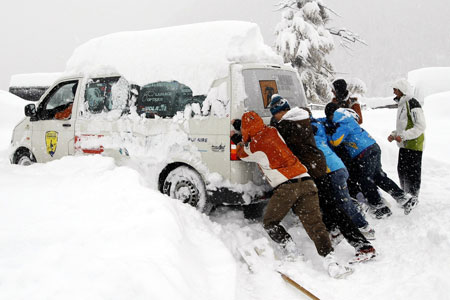
Meanwhile, snow blizzards that continued for the third day have cut off a number of villages in central Serbia. Villages at the foot of Mt. Suvobor are the worst affected, reports say. No buses are traveling between the villages of Pranjani, Kamenica, Teo?in, Leu?i, Kotuni?i and Brezna, and the nearest town of Gornji Milanovac, Beta has learned form the local bus company. A bus slid off the road in the area yesterday, due to high deposits of snow on the road surface, after which police blocked traffic on the regional route between Gornji Milanovac and Poega in western Serbia. Snow is falling unabated for the third day. Drivers are advised to drive carefully and use winter equipment for their vehicles.
Nov 16, 2007
Por qué no te callas Al Gore ?
By Alexandre Aguiar, MetSul Weather Center (Brazil)
During a summit in Chile King Juan Carlos of Spain told the president of Venezuela Hugo Chavez to shut up: “Por qué no te callas” (Why do you not shut up?). Someone must tell Al Gore the same or invite him to visit this corner of the world. It is a never ending winter here in South America. What a hell is happening this year with a seven-month winter, asked a famous TV journalist about the unusual climatic winter of 2007 that began with fury in May and still persist in November. Buenos Aires recorded this Thursday (November 15th) the lowest temperature for the month of November in 90 years. Temperature in the Downtown weather station reached 2.5C. Since records began more than a century ago, only two days had colder lows in November. It was in 1914 (1.6) and 1917 (2.4). And ninety years ago the urban heat island effect was much less pronounced than nowadays, what turns the temperature observed today remarkable.
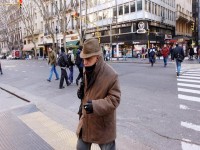
In the southernmost state of Rio Grande do Sul in Brazil temperatures fell to 2.3ºC degrees in several towns near the border with Uruguay on Thursday. Wind and cloud cover prevented lower temperatures in the higher altitudes, but earlier in the week several towns in the Sierras region recorded temperatures near zero Celsius and frost. In Sao Joaquim, the low was 1.6 below zero with moderate frost on Monday (November 12th).
Further south, the problem is the excessive ice. The Brazilian Base Comandante Ferraz (file image above) in Antarctica is rationing water. Never in the last twenty years the weather was so cold and snowy this time of the year in the Brazilian post in the South Pole. The nearby lakes that provide water to the base are frozen since September. The heliport that allows the arrival of food and bottled water by air is under three meters of snow. Water for human consumption is limited to the fifty Brazilian researchers in the region and the situations turns more dangerous each day. So, por qué no te callas Al Gore ? Read more here.
Nov 14, 2007
NASA Sees Arctic Ocean Circulation Do An About-Face
By JPL/NASA, Pasadena, CA
A team of NASA and university scientists has detected an ongoing reversal in Arctic Ocean circulation triggered by atmospheric circulation changes that vary on decade-long time scales. The results suggest not all the large changes seen in Arctic climate in recent years are a result of long-term trends associated with global warming. “Our study confirms many changes seen in upper Arctic Ocean circulation in the 1990s were mostly decadal in nature, rather than trends caused by global warming,” said Morison. While some 1990s climate trends, such as declines in Arctic sea ice extent, have continued, these results suggest at least for the ‘wet’ part of the Arctic—the Arctic Ocean—circulation reverted to conditions like those prevalent before the 1990s,” he added. During its strong counterclockwise phase in the 1990s, the Arctic environment changed markedly, with the upper Arctic Ocean undergoing major changes that persisted into this century. Many scientists viewed the changes as evidence of an ongoing climate shift, raising concerns about the effects of global warming on the Arctic. Read more here.
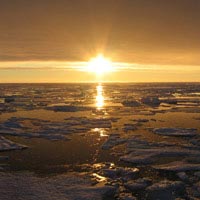
Nov 11, 2007
It’s All About the Sun
By Lawrence Solomon, Financial Post
Climate Change by Jupiter
The alignment of the planets, and especially that of Jupiter and Saturn, control the climate on Earth. So explained Rhodes Fairbridge of Columbia University, a giant in science over much of the last century whose accomplishments are perhaps unsurpassed for their breadth, depth, and volume. This one man authored or co-authored 100 scientific books and more than 1,000 scientific papers, he edited the Benchmarks in Geology series (more than 90 volumes in print) and was general editor of the Encyclopaedias of the Earth Sciences. He edited eight major encyclopedias of specialized scientific papers in the atmospheric sciences and astrogeology; geomorphology; geochemistry and the earth sciences; geology, sedimentology, paleontology, oceanography and, not least, climatology
Changes in sunspots and other solar activity, scientists have realized for more than two centuries, correlate closely with the climate of Earth, explaining the ice ages and periods of great warming.
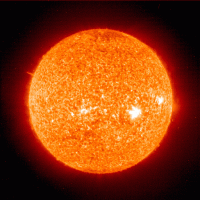
But what, Dr. Fairbridge wondered, causes these changes in our sun? The sun’s own orbit, he found, has eight characteristic patterns, all determined by Jupiter’s position relative to Saturn, with the other planets playing much lesser roles. Some of these eight have orderly orbits, smooth and near-circular. During such orbits, solar activity is high and Earth heats up. Some of the eight orbits are chaotic, taking a loop-the-loop path. These orbits correspond to quiet times for the sun, and cool periods on Earth. Every 179 years or so, the sun embarks on a new cycle of orbits. One of the cooler periods in recent centuries was the Little Ice Age of the 17th century, when the Thames River in London froze over each winter. The next cool period, if the pattern holds, began in 1996, with the effects to be felt starting in 2010. Some predict three decades of severe cold. Read more here. See also the Icecap All About Climate review of this issue here and here.
Nov 09, 2007
Comments on the UK Author of Global Warming Story Hoax Who Spoke Out
By Roy Spencer, Principal Research Scientist at the University of Alabama in Huntsville
An anonymous Brit has now admitted in a brief interview that he wrote the fake global warming research paper which is claimed to have fooled some of us “global warming skeptics”. His stated purpose was to “expose the credulity and scientific illiteracy of many of the people who call themselves climate sceptics”.
I would argue that he has done just the opposite. Several of us (scientists and non-scientists alike) were able, within a matter of seconds to minutes, to identify the paper as a fake. We then spread the word, warning others of the hoax. Therefore, we showed that we do not, as the hoaxer claims, “believe almost anything if it lends support to their position”. We did exactly the opposite.
In contrast, the hoaxer himself shows that he continues to believe in urban legends. To the inteviewer’s question: “Do you think humanity is to blame for the current observed warming?”, the hoaxer replied, “Yes. The science could scarcely be clearer”.
This myth continues despite the fact that there have been NO scientific papers published with evidence that our current warmth is not due to natural climate variability, e.g., a small change in cloudiness, or precipitation efficiency, or general circulation of the atmosphere, or a variety of other possible explanations that do not involve manmade greenhouse gas emissions. Thus, I would say that not only did the hoaxer’s attempt fail, he would do well to be a little more discerning about scientific claims from politicians and actors. Read more here.
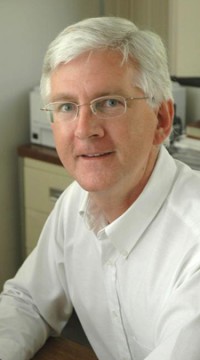
|
|
|
|







